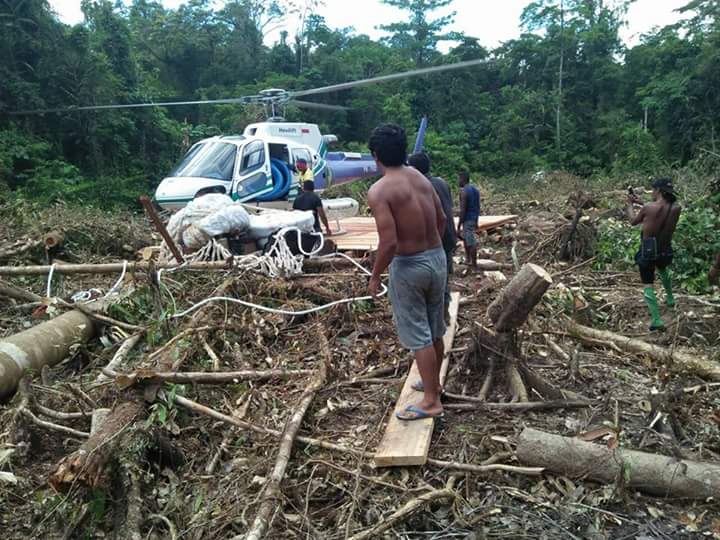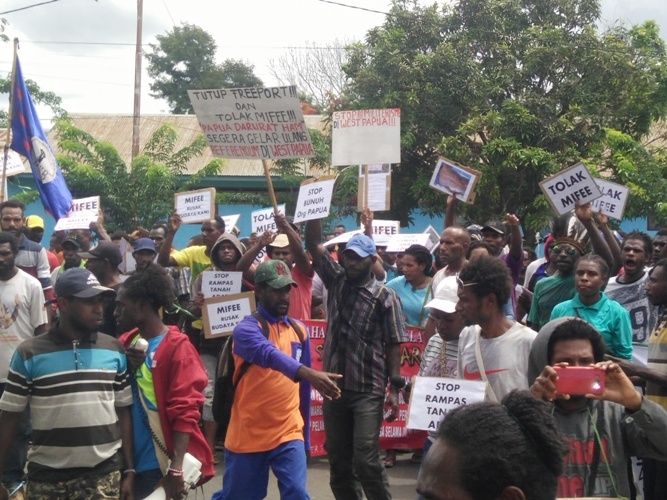[This is one of the images which circulated on social media in early 2018, purporting to show a new helicopter landing pad made by illegal gold miners in the remote forests of the Koroway people. Now it appears that mining was already taking place in the area three years ago]
At the start of this year, several photographs showing illegal gold mining in the Koroway lands went viral on social media. The photos show work to build a helicopter landing pad to drop off and pick up mining equipment, believed to be near the head of the Deiram River. The authenticity of these photos can’t yet be confirmed. However, a similar case had previously occurred in the Danowage area three years ago, in 2015 or thereabouts. Our knowledge of that incident comes from the reports of Koroway schoolchildren. They told their teacher about illegal gold mining around Danowage. These schoolchildren had been working for the gold miners.
This article is based on the stories four Koroway schoolchildren told to their teacher in early February 2018. The name of the teacher is being withheld in this article, and the names used for the children who gave evidence are not their real names.
‘Silver Water’
Yakobus told of how he had worked for a gold miner in the Landslide area, to the south of Danowage, 15 minutes away by katingting (a boat with a small motor). As he explained to his teacher, he had worked for straight-haired (a term for migrants from outside Papua) miners, from the Bugis ethnic group. He was given the task of building a base camp, carrying equipment, splitting firewood and other odd-jobs. However Yakobus claimed he had witnessed the whole mining process from start to finish. The person Yakobus was working for was called Koprak.
Yakobus told his teacher that the people who came to mine gold used a water pump, carpet, cloth for straining, pans and also ‘silver water’.
“The silver water is so heavy, even half a jerry can of cooking oil is so heavy, I can’t even pick it up”, said Yakobus.
Yakobus explained in simple language how silver water forms into balls, as if it were from outer space. He compared the weight of the jerry can with a battery from a solar panel system which weighs around 48 kilogrammes.
Obviously when Yakobus said silver water, he was referring to mercury, a heavy metal.
“Did they throw the silver water in the river?”, the teacher tried to make the question clearer, trying to get more information from Yakobus.
Yakobus said no. The illegal miners used the silver water to process more gold.
However the teacher was still not satisfied, and so asked Yakobus to describe how the silver water was used.
Yakobus related how the silver water was used to separate gold from black sand. The method used was to add a little water and silver water to the gold and sand mix and then stir. Then the gold would automatically be separated from the sand, and was kept, while the remaining water and black sand was thrown away. The silver water was poured into a bottle, and then strained through a cloth to filter out the water.
“After that they stored the silver water to use again and threw away the left-over water”, Yakobus said.
Yakobus didn’t know that the left over water which still contains mercury poses a danger to the environment. He went on to say that this water would be thrown anywhere, into the bushes, on the ground, or even into the river.
This practice represents a serious risk to the Koroway people’s livelihood, bearing in mind that the Koroway community depend on the Deiram river for their lifelihood, including transportation, a source of food and a source of clean water.
The miners gave Yakobus 900,000 Rupiah for 12 days work. During those twelve days they were working, the yields had been low. So after 12 days they stopped mining and moved to Yaniruma. The miners asked Yakubus to come with them to Yaniruma, but Yakobus refused saying he wanted to go to church, as it was a Saturday when they asked. Read More



